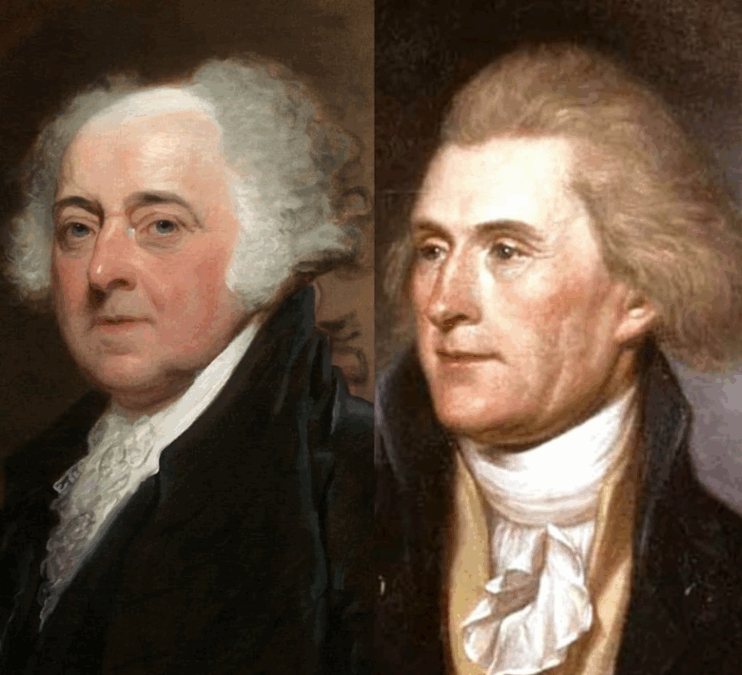By Douglas V. Gibbs
Let me know if this sounds familiar.
The Federalist Party lost in a landslide in 1800. They claimed it wasn’t a landslide, because the decision had to be made by the House of Representatives, but the top two candidates were both Jeffersonian Republicans. Though a fantastic revolutionary, John Adams’ presidency had been an abject failure, and his reelection bid fell flat before it even got off the ground. Unfortunately, President John Adams followed the advice of Alexander Hamilton, who believed the federal government’s superiority over the States should be absolute. He called for a centralization of power, usurpation of the Constitution by interpreting its language through implied law, rather than a strict adherence to it as his opponents suggested. Hamilton had already inserted a central banking system into America’s economy, and Adams continued Hamilton’s nationalist vision, favoring centralized fiscal control. Taxes went up, in particular a controversial property tax that led to widespread resentment. Increased federal spending and taxation burdened farmers, small landowners (especially in rural areas), and drove prices upward. Through the Alien and Sedition Acts the Federalist Party bureaucrats were able to suppress dissent, often negatively affecting business confidence and the public trust while heightening political division. The policies provoked backlash from those who felt overtaxed and underrepresented, marring Adams’ presidency with political volatility and public unrest. Meanwhile, wars around the world began to erupt, with the United States caught in a Quasi-War with France over trade routes and strained maritime commerce while both the British and French interfered with American ships complicating exports and imports, especially for merchants. The United States paid highly for international commerce and Adams left it alone to fester with the intent to keep the trade as free as possible. Cities like Boston, Philadelphia and New York were hotbeds of media warfare who published inflammatory rhetoric creating public anger, and both political parties accusing each other of undermining the republic, sometimes leading to street-level confrontations and duels. In regions like the lands inhabited by Pennsylvania Dutch Farmers the political tension heightened with localized unrest, and partisan hostility. They resisted federal officers as they tried to carry out federal law regarding the Direct Tax of 1798, a rebellion that involved armed resistance to federal tax assessors. Adams deployed federal troops, arresting and convicting many angry opponents, but Adams later used his presidential power to pardon to pardon not only those involved in Fries’s Rebellion, but a number of others who many did not believe deserved pardons. Neighbors were called on to report their neighbors for seditious activities, and the courtrooms were used in a partisan manner to go after Adams’ political enemies in the first example of the use of lawfare in the history of the United States. After the Federalist Party’s loss in 1800 to Thomas Jefferson and his Republican Party, the party of Hamilton and Adams was leaderless, lost, and unwilling to deviate from the very ideological policies that had led to their defeat. The Federalist Party had not only lost the White House, but also both Houses of Congress, and entrenched themselves in the federal court system from where they would constantly attack Jefferson’s administration. Despite their attacks, Thomas Jefferson began to reduce the debt by eliminating much of the unnecessary and wasteful federal spending that had emerged during the Adams presidency, and revamping tariff policies increasing tariffs charged against other countries, saving the country millions of dollars. He fired half of the bureaucracy – the Federalist Party half. He reorganized the executive branch, worked to reduce the number of Federalist Party judges who had been unlawfully appointed, and Jefferson tried to navigate a neutral course between France and Britain – the geopolitical tides of the Napoleonic Wars made normalization nearly impossible. Jefferson, however, based on his relationship with France, was able to purchase a vast territory for a very low price, using the conflict between France and Britain to his advantage since France was in need of capital and saw their lands in North America as being impossible to defend. The public’s approval of Jefferson increased to the point that the Republicans would enjoy a long course of success, or at least until internal strife during Andrew Jackson’s reign split the party from within, pushing it to become the Democratic-Republican Party, and ultimately the Democratic Party which was intent to reject much of Thomas Jefferson’s originalist beliefs and push for a stronger executive and to push for more democracy claiming that only democracy could save the republic.
The Democrats lost in a landslide in 2024. They claimed it wasn’t a landslide, because the swing states that had sent Donald Trump’s electoral count to 312 over Kamala Harris’s 226 were each won by relatively narrow margins. Nonetheless, the top two candidates, Trump and J.D. Vance, were seen by the public as being vastly popular, and they not only won the Electoral College, but also the popular vote. After a long tenure in the U.S. Senate during which the Democrats claimed made Joseph Biden a fantastic politician, his failed mental capacity threw into the ring in a very undemocratic manner Kamala Harris who as Vice President had been a part of a presidency by Biden that was seen as an abject failure. As a result of his failures, and lack of mental acuity, Biden’s bid for reelection fell flat before it even got off the ground, and Harris’s campaign crashed and burned. As President, unfortunately, Joe Biden followed the advice of the more radical wing of the Democratic Party who believed the federal government’s superiority over the States should be absolute, the Constitution is antiquated and the Electoral College needs to be deep-sixed, and that there should be a centralization of power in the federal government. As a result, the Biden administration consistently usurped the Constitution by interpreting its language through implied law, rather than a strict adherence to it as his opponents suggested. America has already been hampered by a central banking system called the Federal Reserve over the last hundred-plus years, and Biden kicked those Keynesian economic ideas into high gear continuing the progressive nationalist vision, favoring centralized fiscal control. Taxes went up, in particular a controversial Corporate Alternative Minimum Tax which was applied to corporations with over $1 billion in financial statement income and a 1% Excise Tax on Stock Buybacks which penalized publicly traded companies for repurchasing their own shares. Taxes were also increased on crude oil and petroleum products (16.4 cents per barrel), and the Biden Administration put in place a Loss Limitation Extension (Section 461) which restricts the ability of non-corporate taxpayers to deduct business losses. The Democrats in power also proposed, but did not enact higher taxes on wage and investment income, an increased corporate tax rate, capital gains tax hikes, and automatically increase all income tax rates if the 2017 Tax Cuts and Jobs Act originally initiated by the first Trump administration was not renewed. The taxes and policies were paired with an increase of federal spending and taxation burden on average Americans driving prices upward. Through DEI and censorship policies the Democratic Party bureaucrats were able to suppress dissent, often negatively affecting business confidence and the public trust while heightening political division. The policies provoked backlash from those who felt overtaxed and underrepresented, marring Biden’s presidency with political volatility and public unrest. Meanwhile, wars around the world began to erupt, with the United States caught in a quasi-manner in a war between Ukraine and Russia. The war in Eastern Europe as well as other conflicts and trade policies by the Biden Administration strained international trade and strained maritime commerce, as well as emboldening China’s grip on the markets complicating exports and imports, especially for American producers and retailers. The United States paid highly for international commerce thanks to unfair tariff policies and the Biden Administration left it alone to fester with the intent to keep the trade as free as possible. Cities which had erupted during President Trump’s first term became hotbeds of media warfare who aired and published inflammatory rhetoric inflaming public anger with both political parties accusing each other of undermining the democracy, sometimes leading to street-level confrontations and violence. In regions like the Central Valley in California, leftist policies drained the regions of their ability to adequately farm, while the cities suffered under relentless progressive-leftist rule creating political tension that heightened with localized unrest, and partisan hostility. After Trump became President in 2025, they resisted federal officers as they tried to carry out federal law regarding immigration. Trump has felt it necessary, in response, to deploy federal troops, arresting and convicting many angry opponents for their unlawful behavior and activities. At the end of Biden’s presidency, rather than apprehend and punish lawbreakers, he used his presidential power to pardon seditious persons and criminals, pardoning not only those involved in the ongoing conspiracies against Donald J. Trump, but a number of others who many did not believe deserved pardons. During Biden’s years of Orwellian WOKEism, neighbors were called on to report their neighbors for seditious activities or anti-DEI (or anti-LGBTQ+) rhetoric or business practices. The courtrooms were used in a partisan manner to go after Biden’s political enemies in the latest example of the use of lawfare in the United States. After the Democratic Party’s loss in 2024 to Donald J. Trump and his Republican Party, the party of Progressive Socialism has become leaderless, lost, and unwilling to deviate from the very ideological policies that had led to their defeat. The Democratic Party had not only lost the White House, but also both Houses of Congress (especially when you consider how many establishment GOP members also lost seats), and so they decided to take advantage of their entrenched positions in the federal court system from where they have constantly attacked Trump’s administration. Despite their attacks, Donald Trump has begun to reduce the debt by eliminating much of the unnecessary and wasteful federal spending that had emerged during the Biden presidency, and using tariff policies to increase tariffs against our international trading partners, saving the country billions of dollars. He fired much of the bureaucracy – all of them progressives. He reorganized the executive branch, is working to reduce the number of Democratic Party aligned judges who have been unlawfully maladministering their office, and he’s trying to navigate a neutral course between Ukraine and Russia as well as between Israel and the Palestinians – the geopolitical tides caused by the hatred that consumes Islam against Israel has made normalization nearly impossible. Trump, however, based on his relationship with Ukraine is attempting to use the conflict between Russia and Ukraine to his advantage by seeking an agreement regarding rare mineral resources in Ukraine. The public’s approval of Trump has increased to the point that the Republicans look like they may enjoy a long course of success, or at least unless internal strife bubbles up and splits the party from within. Ultimately the Democratic Party which rejects much of Donald Trump’s political beliefs and push for a stronger executive and pushes for more democracy claiming that only democracy could save the republic looks like they may be heading for the same kind of collapse as the Federalist Party about two centuries ago with the Federalists getting to the point that they couldn’t win any elections by the 1820s.
— Political Pistachio Conservative News and Commentary



